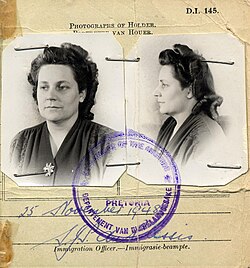
South African ancestry is shaped by the country's complex past, which includes indigenous populations, European colonization, the transatlantic slave trade, and waves of migration from all over the world. Tracing South African ancestry often reveals connections to a broader global heritage.
Research your ancestors on MyHeritage
What is South African ancestry?What is South African ancestry?
South African ancestry refers to the lineage and heritage of individuals who trace their roots to the diverse populations of South Africa. These populations include:
- Indigenous African ancestry comprised of the Khoisan, the original inhabitants of South Africa, and the Bantu-speaking peoples such as the Xhosa, Zulu, Sotho and Tswane.
- European ancestry comprised of Dutch, and British settlers as well as French Huguenots, German and Portuguese settlers.
- Asian ancestry includes Indian indentured laborers brought by the British to work on the sugar plantations in Natal, as well as smaller groups of Chinese and Malaysian people, many of whom descend from enslaved or indentured workers brought to the region.
- African ancestry through slavery. Enslaved Africans from various parts of the continent were brought to South Africa, particularly during the Dutch colonial period. These individuals and their descendants, often mixed with other populations, played a significant role in the genetic makeup of the "Coloured" community, a distinct ethnic group in South Africa.
Understand South African history and record-keepingUnderstand South African history and record-keeping
As you begin to research your South African ancestry, it's important to have an understanding of South Africa's history. Knowing the historical context helps you understand why certain records exist and where they can be found. For example, wars, and migrations, often influenced the creation of specific records, such as military rolls, immigration lists, and death certificates. Historical shifts, such as the introduction of civil registration or changes in laws, affect where and how records were kept. Understanding these shifts helps you locate relevant documents.
- Brief South African timeline:
- 1652: The Dutch arrive[1]
- 1671-1680: The French Huguenots arrive[2]
- 1600-1800s: "Trekboere" begin to move inwards
- 1795-1806: The British arrive[3]
- 1820: Large scale British emigration begins
- 1830: Voortrekkers move into the interior in the "Great Trek"
- 1899-1902: Anglo Boer War
- 1910: Republic of South Africa
- Record Repositories in South Africa:
Records are kept on the local level in each province of South Africa. There are nine provinces.
There are six main archives:
- Cape Town
- Pretoria
- Pietermaritzburg
- Durban
- Port Elizabeth
- Bloemfontein
NARSSA (National Archives and Records Service of South Africa) offers a searchable online database of South African records. This is an index only collection and does not contain any document images. If you locate an ancestor in the index, copies of the documents can be ordered through the Archive.
Identify key sourcesIdentify key sources
- Civil registration includes birth, marriage, and death records. The table below illustrates the dates that civil registration began in each of the four original provinces of South Africa.
- Church records include baptisms, marriages, and burials. These records are particularly valuable given that civil registration records are difficult to access.
- Probate records (Deceased Estate files) are one of the most useful sources for South African genealogy. The estate file often includes a death notice, a will (if one exists), the Liquidation and Distribution account, an inventory and other correspondence dealing with the estate.
| Province | Birth | Marriage | Death |
|---|---|---|---|
| Cape | 1895 | 1700 | 1895 |
| Natal | 1868 | 1845 | 1888 |
| Transvaal | 1901 | 1870 | 1901 |
| Orange Free State | 1903 | 1848 | 1903 |
Other sourcesOther sources

While the sources listed above are the key sources for researching your South African ancestry, there are others that can be very helpful:
- Cemetery records and gravestones
- Passenger lists and immigration records
- Military records, such as those for the Anglo Boer War.
- Settler records including those for the Dutch, 1820 British Settlers, German settlers, and Norwegian Settlers to Natal.
See alsoSee also
Research your ancestors on MyHeritage
Explore more about how to research your South African ancestryExplore more about how to research your South African ancestry
- South Africa - Collection Catalog at MyHeritage, which contains
- Indigenous People of South Africa on Geni.com
- Genealogy Projects tagged with South African on the Geni Family Tree
- Our Volunteers: Gerry van Eeden of South Africa on the MyHeritage blog
- Our Stories: SmartMatches and a great-grandfather’s bible on the MyHeritage blog
- Genealogical Society of South Africa (eGGSA). eGGSA is the online branch of the Genealogical Society of South Africa. They provide information, publications and research education on tracing your South African ancestors. eGGSA also provides transcriptions of documents, gravestone photographs, passenger lists, 1820 Settler correspondence, and many other sources.
References
- ↑ "Cape Province | History, Geography, Map, & Culture of South Africa | Britannica". www.britannica.com. Retrieved 2024-09-04.
- ↑ "The Huguenot History". The Huguenot Society of South Africa. Retrieved 2024-09-04.
- ↑ History of South Africahttps://en.wikipedia.org/wiki/History_of_South_Africa

